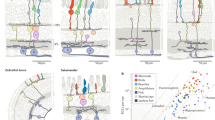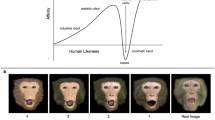Abstract
THOSE who read Colonel Herschel's letter in NATURE of January 18 may be interested in some observations which I made during the summer upon the sight and eyes of cats. Whereas in men and monkeys the retina is backed by black pigment, as a photographer backs a plate when his camera is to be directed towards a window, in almost all other mammals it rests on a brightly burnished layer of cellular or fibrous tissue, the tapetum. It is this mirror which throws the light back to an observer who stands-between the animal and the source of light. The eye is at the same time a camera focussed to form an image of the observer on its sensitive screen and a lantern focussed to project light upon the observer. Such an arrangement appears to a photographer fatal to the formation of an image sharp in line and dot.
This is a preview of subscription content, access via your institution
Access options
Subscribe to this journal
Receive 51 print issues and online access
$199.00 per year
only $3.90 per issue
Buy this article
- Purchase on Springer Link
- Instant access to full article PDF
Prices may be subject to local taxes which are calculated during checkout
Similar content being viewed by others
Rights and permissions
About this article
Cite this article
HILL, A. Are Eyes ever Autophanous?. Nature 88, 446–447 (1912). https://doi.org/10.1038/088446a0
Issue Date:
DOI: https://doi.org/10.1038/088446a0
Comments
By submitting a comment you agree to abide by our Terms and Community Guidelines. If you find something abusive or that does not comply with our terms or guidelines please flag it as inappropriate.



